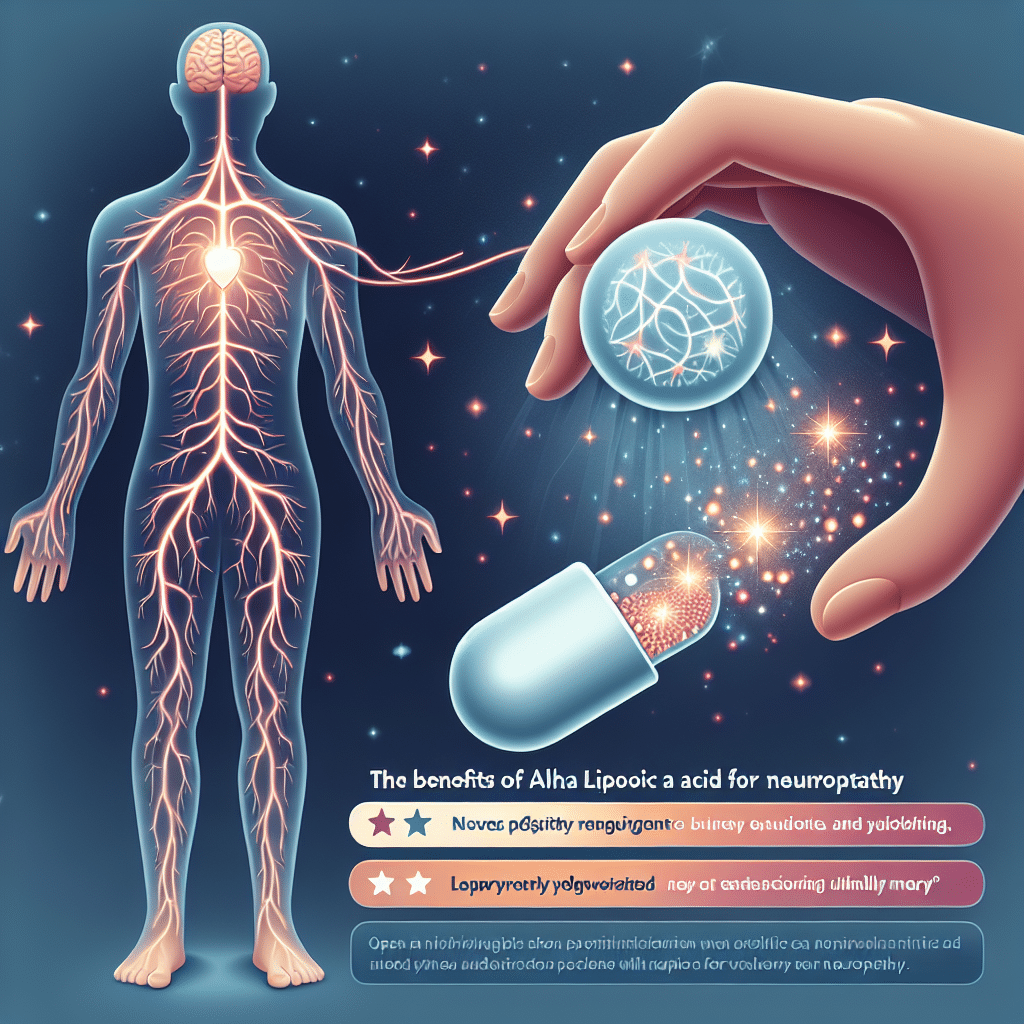Alpha Lipoic Acid Neuropathy Reviews and Benefits
-
Table of Contents
- Alpha Lipoic Acid and Neuropathy: A Deep Dive into Reviews and Benefits
- Understanding Alpha Lipoic Acid
- The Link Between ALA and Neuropathy
- Reviewing the Evidence: ALA’s Efficacy in Neuropathy Treatment
- Case Studies and Clinical Trials
- Personal Reviews and Anecdotal Evidence
- Understanding the Dosage and Side Effects
- Comparing ALA with Other Neuropathy Treatments
- ALA’s Additional Health Benefits
- Conclusion: Weighing the Pros and Cons of ALA for Neuropathy
- Discover ETchem’s Protein Products
Alpha Lipoic Acid and Neuropathy: A Deep Dive into Reviews and Benefits
Peripheral neuropathy is a condition that affects millions of people worldwide, causing pain, numbness, and other uncomfortable sensations. Traditional treatments often come with side effects, leading many to seek alternative remedies. Alpha Lipoic Acid (ALA), a naturally occurring compound, has gained attention for its potential benefits in managing neuropathy symptoms. This article explores the reviews and benefits of ALA for neuropathy, supported by research and case studies.
Understanding Alpha Lipoic Acid
Alpha Lipoic Acid is an antioxidant found in every cell of the body, where it helps turn glucose into energy. Unlike other antioxidants, ALA is both water and fat-soluble, allowing it to work in every cell or tissue in the body. Moreover, it can regenerate other antioxidants, such as vitamins C and E, enhancing their effectiveness.
The Link Between ALA and Neuropathy
Neuropathy, particularly diabetic neuropathy, involves oxidative stress and inflammation. ALA’s antioxidant properties make it a candidate for reducing these harmful processes. Studies suggest that ALA may improve nerve blood flow, reduce oxidative stress, and improve nerve conduction, potentially alleviating neuropathy symptoms.
Reviewing the Evidence: ALA’s Efficacy in Neuropathy Treatment
Several studies have examined ALA’s impact on neuropathy with promising results. A meta-analysis of randomized controlled trials found that ALA significantly improved symptomatic diabetic neuropathy. Patients reported reduced pain, burning, and numbness after taking ALA supplements.
Case Studies and Clinical Trials
- A pivotal trial known as the SYDNEY 2 study demonstrated that oral ALA at a dose of 600 mg daily significantly improved neuropathic symptoms over a period of 5 weeks.
- Another study, the ALADIN III trial, showed that intravenous ALA improved neuropathic deficits and was well-tolerated by patients.
Personal Reviews and Anecdotal Evidence
Personal reviews from individuals with neuropathy often highlight the benefits of ALA supplementation. Many report reduced pain and improved quality of life. However, it’s important to note that personal experiences can vary, and what works for one person may not work for another.
Understanding the Dosage and Side Effects
The recommended dosage of ALA for neuropathy typically ranges from 600 to 1,800 mg per day. Side effects are generally mild and may include skin rash, stomach issues, and potential interactions with certain medications. It’s crucial to consult with a healthcare provider before starting ALA supplementation.
Comparing ALA with Other Neuropathy Treatments
When compared to traditional neuropathy medications, ALA has a favorable safety profile. Unlike some pharmaceuticals, ALA is not associated with significant adverse effects such as dizziness or drowsiness. This makes it an attractive option for those seeking a more natural approach to managing neuropathy symptoms.
ALA’s Additional Health Benefits
Beyond neuropathy, ALA has been studied for its potential benefits in other areas of health:
- Improving insulin sensitivity in patients with type 2 diabetes
- Reducing the risk of cardiovascular disease
- Protecting against age-related cognitive decline
- Supporting weight loss efforts
Conclusion: Weighing the Pros and Cons of ALA for Neuropathy
In conclusion, Alpha Lipoic Acid shows promise as a treatment for neuropathy, with numerous studies and personal reviews supporting its efficacy and safety. While it may not be a cure-all, ALA offers a potential complementary approach to managing neuropathy symptoms and improving quality of life. As with any supplement, it’s essential to consult with a healthcare provider to determine the appropriate dosage and ensure it’s suitable for your individual health needs.
Discover ETchem’s Protein Products
If you’re looking for high-quality protein products to complement your health regimen, consider exploring ETchem’s offerings. Their range of collagen products, including marine, fish, bovine, and chicken collagen, provides various options to support your health goals. ETchem’s commitment to quality and customer satisfaction makes them a top choice for protein supplements.
About ETChem:
ETChem, a reputable Chinese Collagen factory manufacturer and supplier, is renowned for producing, stocking, exporting, and delivering the highest quality collagens. They include marine collagen, fish collagen, bovine collagen, chicken collagen, type I collagen, type II collagen and type III collagen etc. Their offerings, characterized by a neutral taste, instant solubility attributes, cater to a diverse range of industries. They serve nutraceutical, pharmaceutical, cosmeceutical, veterinary, as well as food and beverage finished product distributors, traders, and manufacturers across Europe, USA, Canada, Australia, Thailand, Japan, Korea, Brazil, and Chile, among others.
ETChem specialization includes exporting and delivering tailor-made collagen powder and finished collagen nutritional supplements. Their extensive product range covers sectors like Food and Beverage, Sports Nutrition, Weight Management, Dietary Supplements, Health and Wellness Products, ensuring comprehensive solutions to meet all your protein needs.
As a trusted company by leading global food and beverage brands and Fortune 500 companies, ETChem reinforces China’s reputation in the global arena. For more information or to sample their products, please contact them and email karen(at)et-chem.com today.





